外语焦虑量表英文版
英语学习焦虑量表的编译及信效度检验
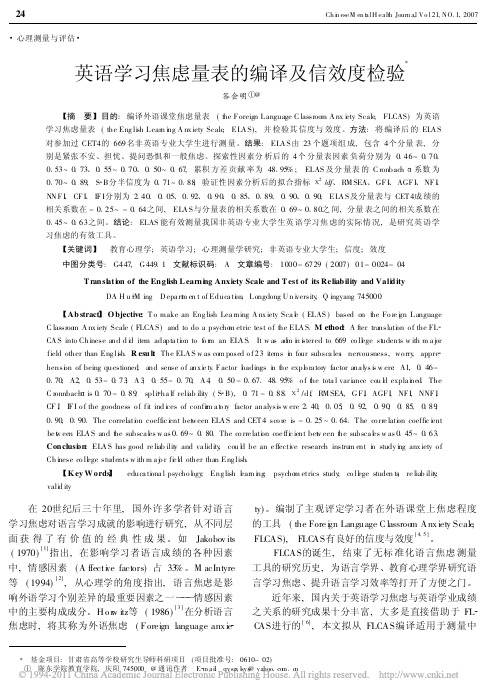
K ey W ords∀ ! educa tiona l psycho logy; Eng lish learn ing; psychom etrics study; co llege studen ts; re liab ility; valid ity
! ! 在 20世纪后三十年里, 国外许多学者针对语言 学习焦虑对语言学习成就的影响进行研究, 从不同层 面 获 得 了 有 价 值 的 经 典 性 成 果。 如 Jakobov its ( 1970) [ 1] 指出, 在影响学习者语言成 绩的各种因素 中, 情感因素 ( A ffect ive factors) 占 33% 。M acIntyre 等 ( 1994) [ 2] , 从心理学的角度指出, 语言焦虑是影 响外语学习个别差异的最重要因素之一 # # # 情感因素 中的主要构成成分。H o rw itz等 ( 1986) [ 3 ] 在分析语言 焦虑时, 将其称为外语焦虑 ( F oreign language anx ie
英语学习焦虑量表
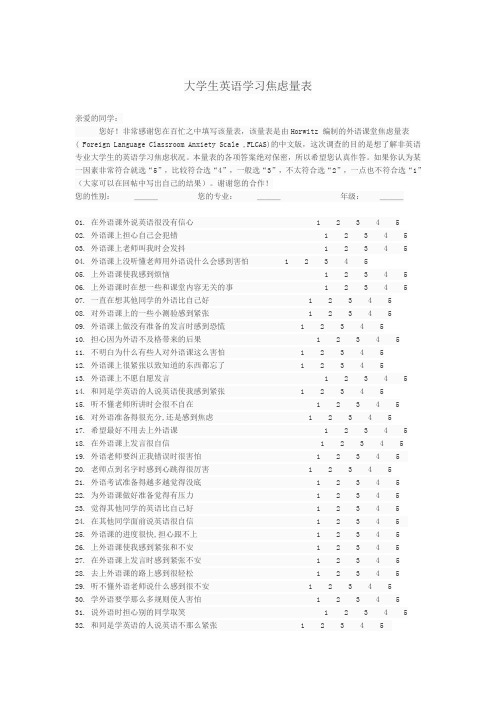
大学生英语学习焦虑量表亲爱的同学:您好!非常感谢您在百忙之中填写该量表,该量表是由Horwitz 编制的外语课堂焦虑量表( Foreign Language Classroom Anxiety Scale ,FLCAS)的中文版,这次调查的目的是想了解非英语专业大学生的英语学习焦虑状况。
本量表的各项答案绝对保密,所以希望您认真作答。
如果你认为某一因素非常符合就选“5”,比较符合选“4”,一般选“3”,不太符合选“2”,一点也不符合选“1”(大家可以在回帖中写出自己的结果)。
谢谢您的合作!您的性别:___您的专业:___年级:___01. 在外语课外说英语很没有信心 1 2 3 4 502. 外语课上担心自己会犯错 1 2 3 4 503. 外语课上老师叫我时会发抖 1 2 3 4 504. 外语课上没听懂老师用外语说什么会感到害怕 1 2 3 4 505. 上外语课使我感到烦恼 1 2 3 4 506. 上外语课时在想一些和课堂内容无关的事 1 2 3 4 507. 一直在想其他同学的外语比自己好 1 2 3 4 508. 对外语课上的一些小测验感到紧张 1 2 3 4 509. 外语课上做没有准备的发言时感到恐慌 1 2 3 4 510. 担心因为外语不及格带来的后果 1 2 3 4 511. 不明白为什么有些人对外语课这么害怕 1 2 3 4 512. 外语课上很紧张以致知道的东西都忘了 1 2 3 4 513. 外语课上不愿自愿发言 1 2 3 4 514. 和同是学英语的人说英语使我感到紧张 1 2 3 4 515. 听不懂老师所讲时会很不自在 1 2 3 4 516. 对外语准备得很充分,还是感到焦虑 1 2 3 4 517. 希望最好不用去上外语课 1 2 3 4 518. 在外语课上发言很自信 1 2 3 4 519. 外语老师要纠正我错误时很害怕 1 2 3 4 520. 老师点到名字时感到心跳得很厉害 1 2 3 4 521. 外语考试准备得越多越觉得没底 1 2 3 4 522. 为外语课做好准备觉得有压力 1 2 3 4 523. 觉得其他同学的英语比自己好 1 2 3 4 524. 在其他同学面前说英语很自信 1 2 3 4 525. 外语课的进度很快,担心跟不上 1 2 3 4 526. 上外语课使我感到紧张和不安 1 2 3 4 527. 在外语课上发言时感到紧张不安 1 2 3 4 528. 去上外语课的路上感到很轻松 1 2 3 4 529. 听不懂外语老师说什么感到很不安 1 2 3 4 530. 学外语要学那么多规则使人害怕 1 2 3 4 531. 说外语时担心别的同学取笑 1 2 3 4 532. 和同是学英语的人说英语不那么紧张 1 2 3 4 533. 老师问事先没有准备的问题时感到紧张 1 2 3 4 5此量表分为四个维度,计分方式为5点记分制,反向计分题为2,5,8,11,14,18,22,28,32。
完整word版)Hamilton汉密尔顿焦虑量表
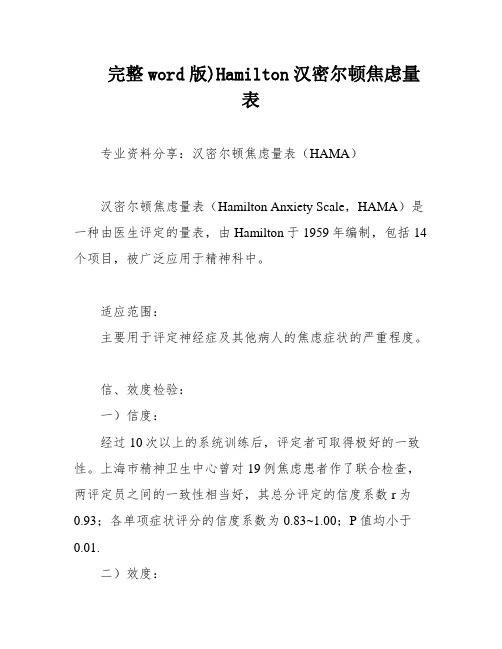
完整word版)Hamilton汉密尔顿焦虑量表专业资料分享:汉密尔顿焦虑量表(HAMA)汉密尔顿焦虑量表(Hamilton Anxiety Scale,HAMA)是一种由医生评定的量表,由Hamilton于1959年编制,包括14个项目,被广泛应用于精神科中。
适应范围:主要用于评定神经症及其他病人的焦虑症状的严重程度。
信、效度检验:一)信度:经过10次以上的系统训练后,评定者可取得极好的一致性。
上海市精神卫生中心曾对19例焦虑患者作了联合检查,两评定员之间的一致性相当好,其总分评定的信度系数r为0.93;各单项症状评分的信度系数为0.83~1.00;P值均小于0.01.二)效度:HAMA总分能很好反映焦虑状态的严重程度。
上海市精神卫生中心曾对36例焦虑性神经症的病情严重程度与HAMA总分间的相关检验效度,其效度系数为0.36(P〈0.05)。
使用方法:一)评定方法:应由经过训练的两名评定员进行联合检查,采用交谈与观察的方式,检查结束后,两评定员各自独立评分。
若需比较治疗前后的症状和病情的变化,则于入组时,评定当时或入组前一周的情况,治疗后2~6周,再次评定,以资比较。
二)评定标准:HAMA的评分为0~4分,5级:()无症状;(1)轻;(2)中等;(3)重;(4)极重。
HAMA无工作用评分标准,各项症状的评定标准如下:1.焦虑心境(us mood):担心、担忧,感到有最坏的事将要发生,容易激惹。
2.紧张(n):紧张感、易疲劳、不能放松、情绪反应,易哭、颤抖、感到不安。
3.害怕(fears):害怕黑暗、陌生人、一人独处、动物、乘车或旅行及人多的场合。
4.失眠(insomnia):难以入睡、易醒、睡得不深、多梦、夜惊、醒后感疲倦。
5.认知功能(cognitive):或称记忆、注意障碍,注意力不能集中,记忆力差。
6.抑郁心境(depressed mood):丧失兴趣、对以往爱好缺乏快感、抑郁、早醒、昼重夜轻。
Sarason考试焦虑量表(TAS)

Sarason考试焦虑量表(TAS)姓名性别年龄年级文化程度父亲文化程度和职业母亲文化程度和职业[指导语]此量表用于测定初中以上学生在考试期间的焦虑水平。
下列37个句子描述人们对参加考试的感受,请你阅读每一个句子,然后根据你的实际情况(感受),在每一题号后()内回答(是或否),答案没有对错、好坏之分,只求按实际情况填写,尽可能快些作答,但切勿遗漏。
1()当一次重大考试就要来临时,我总是在想别人比我聪明得多。
2()如果我将要做一次智能测试,在做之前我会非常焦虑。
3()如果我知道将会有一次智能测试,在此之前我感到很自信()很轻松。
4()参加重大考试时,我会出很多汗。
5()考试期间,我发现自己总是在想一些和考试内容无关的事。
6()当一次突然袭击式的考试来到时,我感到很怕。
7()考试期间我经常想到会失败。
8()重大考试后我经常感到紧张,以至胃不舒服。
9()我对智能考试和期末考试之类的事总感到发怵。
10()在一次考试中取得好成绩似乎并不能增加我在第二次考试中的信心。
11()在重大考试期间我有时感到心跳很快。
12()考试结束后我总是觉得可以比实际上做得更好。
13()考试完毕后我总是感到很抑郁。
14()每次期末考试之前,我总有一种紧张不安的感觉。
15()考试时,我的情绪反应不会干扰我考试。
16()考试期间我经常很紧张,以至本来知道的东西也忘了。
17()复习重要的考试对我来说似乎是一个很大的挑战。
18()对某一门考试,我越努力复习越感到困惑。
19()某门考试一结束,我试图停止有关担忧,但做不到。
20()考试期间我有时会想我是否能完成大学学业。
21()我宁愿写一篇论文,而不是参加一次考试,作为某门课程的成绩。
22()我真希望考试不要那么烦人。
23()我相信如果我单独参加考试而且没有时间限制的话,我会考得更好。
24()想着我在考试中能得多少分,影响了我的复习和考试。
25()如果考试能废除的话,我想我能学得更好。
26()我对考试抱这样的态度:虽然我现在不懂,但我并不担心。
外语焦虑量表英文版
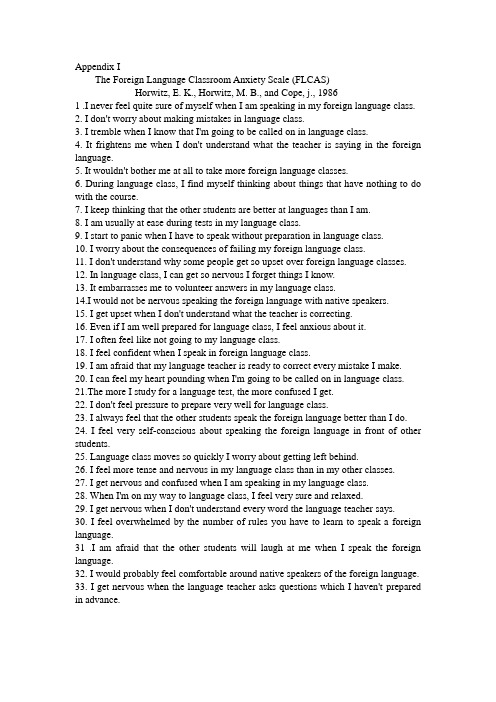
Appendix IThe Foreign Language Classroom Anxiety Scale (FLCAS)Horwitz, E. K., Horwitz, M. B., and Cope, j., 19861 .I never feel quite sure of myself when I am speaking in my foreign language class.2. I don't worry about making mistakes in language class.3. I tremble when I know that I'm going to be called on in language class.4. It frightens me when I don't understand what the teacher is saying in the foreign language.5. It wouldn't bother me at all to take more foreign language classes.6. During language class, I find myself thinking about things that have nothing to do with the course.7. I keep thinking that the other students are better at languages than I am.8. I am usually at ease during tests in my language class.9. I start to panic when I have to speak without preparation in language class.10. I worry about the consequences of failing my foreign language class.11. I don't understand why some people get so upset over foreign language classes.12. In language class, I can get so nervous I forget things I know.13. It embarrasses me to volunteer answers in my language class.14.I would not be nervous speaking the foreign language with native speakers.15. I get upset when I don't understand what the teacher is correcting.16. Even if I am well prepared for language class, I feel anxious about it.17. I often feel like not going to my language class.18. I feel confident when I speak in foreign language class.19. I am afraid that my language teacher is ready to correct every mistake I make.20. I can feel my heart pounding when I'm going to be called on in language class.21.The more I study for a language test, the more confused I get.22. I don't feel pressure to prepare very well for language class.23. I always feel that the other students speak the foreign language better than I do.24. I feel very self-conscious about speaking the foreign language in front of other students.25. Language class moves so quickly I worry about getting left behind.26. I feel more tense and nervous in my language class than in my other classes.27. I get nervous and confused when I am speaking in my language class.28. When I'm on my way to language class, I feel very sure and relaxed.29. I get nervous when I don't understand every word the language teacher says.30. I feel overwhelmed by the number of rules you have to learn to speak a foreign language.31 .I am afraid that the other students will laugh at me when I speak the foreign language.32. I would probably feel comfortable around native speakers of the foreign language.33. I get nervous when the language teacher asks questions which I haven't prepared in advance.。
Hamilton汉密尔顿焦虑量表
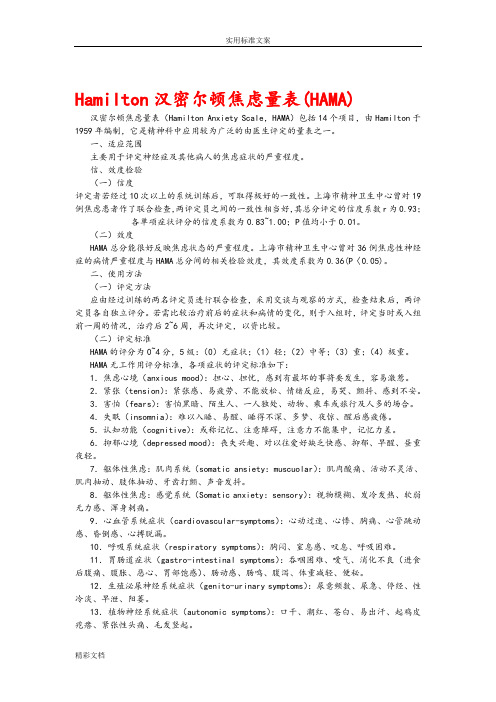
Hamilton汉密尔顿焦虑量表(HAMA)汉密尔顿焦虑量表(Hamilton Anxiety Scale,HAMA)包括14个项目,由Hamilton于1959年编制,它是精神科中应用较为广泛的由医生评定的量表之一。
一、适应范围主要用于评定神经症及其他病人的焦虑症状的严重程度。
信、效度检验(一)信度评定者若经过10次以上的系统训练后,可取得极好的一致性。
上海市精神卫生中心曾对19例焦虑患者作了联合检查,两评定员之间的一致性相当好,其总分评定的信度系数r为0.93;各单项症状评分的信度系数为0.83~1.00;P值均小于0.01。
(二)效度HAMA总分能很好反映焦虑状态的严重程度。
上海市精神卫生中心曾对36例焦虑性神经症的病情严重程度与HAMA总分间的相关检验效度,其效度系数为0.36(P〈0.05)。
二、使用方法(一)评定方法应由经过训练的两名评定员进行联合检查,采用交谈与观察的方式,检查结束后,两评定员各自独立评分。
若需比较治疗前后的症状和病情的变化,则于入组时,评定当时或入组前一周的情况,治疗后2~6周,再次评定,以资比较。
(二)评定标准HAMA的评分为0~4分,5级:(0)无症状;(1)轻;(2)中等;(3)重;(4)极重。
HAMA无工作用评分标准,各项症状的评定标准如下:1.焦虑心境(anxious mood):担心、担忧,感到有最坏的事将要发生,容易激惹。
2.紧张(tension):紧张感、易疲劳、不能放松、情绪反应,易哭、颤抖、感到不安。
3.害怕(fears):害怕黑暗、陌生人、一人独处、动物、乘车或旅行及人多的场合。
4.失眠(insomnia):难以入睡、易醒、睡得不深、多梦、夜惊、醒后感疲倦。
5.认知功能(cognitive):或称记忆、注意障碍,注意力不能集中,记忆力差。
6.抑郁心境(depressed mood):丧失兴趣、对以往爱好缺乏快感、抑郁、早醒、昼重夜轻。
7.躯体性焦虑:肌肉系统(somatic ansiety:muscuolar):肌肉酸痛、活动不灵活、肌肉抽动、肢体抽动、牙齿打颤、声音发抖。
英语专业写作焦虑量表
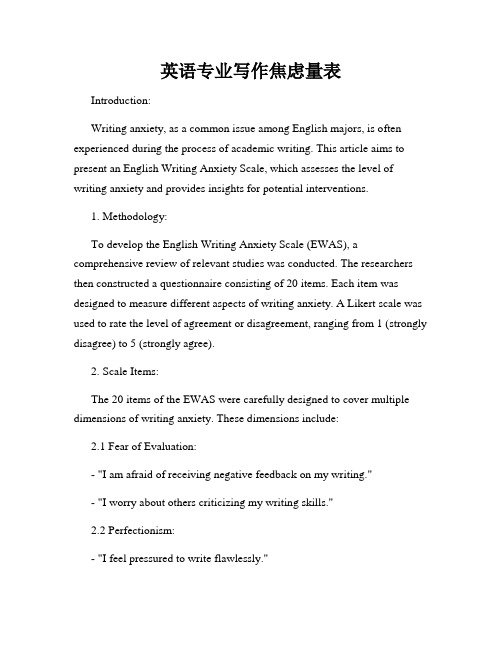
英语专业写作焦虑量表Introduction:Writing anxiety, as a common issue among English majors, is often experienced during the process of academic writing. This article aims to present an English Writing Anxiety Scale, which assesses the level of writing anxiety and provides insights for potential interventions.1. Methodology:To develop the English Writing Anxiety Scale (EWAS), a comprehensive review of relevant studies was conducted. The researchers then constructed a questionnaire consisting of 20 items. Each item was designed to measure different aspects of writing anxiety. A Likert scale was used to rate the level of agreement or disagreement, ranging from 1 (strongly disagree) to 5 (strongly agree).2. Scale Items:The 20 items of the EWAS were carefully designed to cover multiple dimensions of writing anxiety. These dimensions include:2.1 Fear of Evaluation:- "I am afraid of receiving negative feedback on my writing."- "I worry about others criticizing my writing skills."2.2 Perfectionism:- "I feel pressured to write flawlessly."- "I am overly concerned about making mistakes in my writing."2.3 Lack of Confidence:- "I doubt my ability to express my ideas clearly in writing."- "I often feel insecure about my writing skills."2.4 Procrastination:- "I tend to delay starting my writing assignments."- "I frequently find myself putting off writing tasks."2.5 Writer's Block:- "I often struggle to come up with ideas when writing."- "I frequently experience a 'blank mind' when trying to write."3. Administration:The EWAS can be administered both online and offline, depending on the researcher's preference. Participants are encouraged to complete the questionnaire in a quiet and distraction-free environment. Clear instructions regarding the Likert scale and the purpose of the study should be provided to ensure accurate responses.4. Scoring and Interpretation:Each item is scored based on the participant's response, ranging from 1 to 5. The total score is obtained by summing the scores of all 20 items. A higher score indicates a higher level of writing anxiety. Researchers canestablish cut-off points for different anxiety levels based on their research goals.5. Validity and Reliability:To ensure the validity of the EWAS, a pilot study was conducted with a sample of English majors. The results showed a strong correlation between the scores on the EWAS and other established measures of writing anxiety, indicating convergent validity. The scale also demonstrated good internal consistency, with a Cronbach's alpha coefficient above 0.8.6. Implications and Future Research:The English Writing Anxiety Scale provides a useful tool for researchers and educators to identify and address writing anxiety among English majors. By understanding the specific dimensions of writing anxiety, targeted interventions can be developed to alleviate students' writing-related stress. Future research could explore the effectiveness of interventions and track the changes in writing anxiety over time.Conclusion:In conclusion, the English Writing Anxiety Scale offers a reliable and valid instrument for assessing writing anxiety among English majors. By recognizing the factors that contribute to writing anxiety, educators and researchers can implement interventions to assist students in developing more effective writing strategies and ultimately improve their overall writing outcomes.。
sas焦虑自评量表英文版
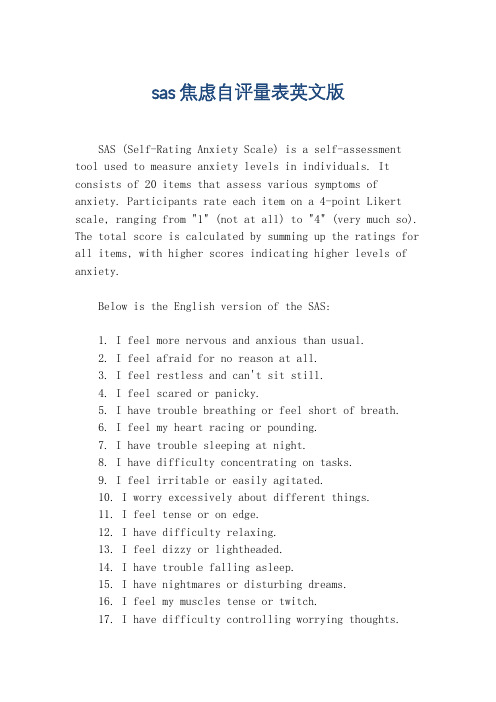
sas焦虑自评量表英文版SAS (Self-Rating Anxiety Scale) is a self-assessment tool used to measure anxiety levels in individuals. It consists of 20 items that assess various symptoms of anxiety. Participants rate each item on a 4-point Likert scale, ranging from "1" (not at all) to "4" (very much so). The total score is calculated by summing up the ratings for all items, with higher scores indicating higher levels of anxiety.Below is the English version of the SAS:1. I feel more nervous and anxious than usual.2. I feel afraid for no reason at all.3. I feel restless and can't sit still.4. I feel scared or panicky.5. I have trouble breathing or feel short of breath.6. I feel my heart racing or pounding.7. I have trouble sleeping at night.8. I have difficulty concentrating on tasks.9. I feel irritable or easily agitated.10. I worry excessively about different things.11. I feel tense or on edge.12. I have difficulty relaxing.13. I feel dizzy or lightheaded.14. I have trouble falling asleep.15. I have nightmares or disturbing dreams.16. I feel my muscles tense or twitch.17. I have difficulty controlling worrying thoughts.18. I feel overwhelmed or out of control.19. I have a fear of losing control or going crazy.20. I feel on the verge of a panic attack.Please rate each item based on how much you have experienced it in the past week, using the following scale:1 - Not at all2 - Somewhat3 - Moderately4 - Very much soAdd up your scores for all 20 items to obtain yourtotal SAS score. Higher scores indicate higher levels of anxiety.。
- 1、下载文档前请自行甄别文档内容的完整性,平台不提供额外的编辑、内容补充、找答案等附加服务。
- 2、"仅部分预览"的文档,不可在线预览部分如存在完整性等问题,可反馈申请退款(可完整预览的文档不适用该条件!)。
- 3、如文档侵犯您的权益,请联系客服反馈,我们会尽快为您处理(人工客服工作时间:9:00-18:30)。
Appendix I
The Foreign Language Classroom Anxiety Scale (FLCAS)
Horwitz, E. K., Horwitz, M. B., and Cope, j., 1986
1 .I never feel quite sure of myself when I am speaking in my foreign language class.
2. I don't worry about making mistakes in language class.
3. I tremble when I know that I'm going to be called on in language class.
4. It frightens me when I don't understand what the teacher is saying in the foreign language.
5. It wouldn't bother me at all to take more foreign language classes.
6. During language class, I find myself thinking about things that have nothing to do with the course.
7. I keep thinking that the other students are better at languages than I am.
8. I am usually at ease during tests in my language class.
9. I start to panic when I have to speak without preparation in language class.
10. I worry about the consequences of failing my foreign language class.
11. I don't understand why some people get so upset over foreign language classes.
12. In language class, I can get so nervous I forget things I know.
13. It embarrasses me to volunteer answers in my language class.
14.I would not be nervous speaking the foreign language with native speakers.
15. I get upset when I don't understand what the teacher is correcting.
16. Even if I am well prepared for language class, I feel anxious about it.
17. I often feel like not going to my language class.
18. I feel confident when I speak in foreign language class.
19. I am afraid that my language teacher is ready to correct every mistake I make.
20. I can feel my heart pounding when I'm going to be called on in language class.
21.The more I study for a language test, the more confused I get.
22. I don't feel pressure to prepare very well for language class.
23. I always feel that the other students speak the foreign language better than I do.
24. I feel very self-conscious about speaking the foreign language in front of other students.
25. Language class moves so quickly I worry about getting left behind.
26. I feel more tense and nervous in my language class than in my other classes.
27. I get nervous and confused when I am speaking in my language class.
28. When I'm on my way to language class, I feel very sure and relaxed.
29. I get nervous when I don't understand every word the language teacher says.
30. I feel overwhelmed by the number of rules you have to learn to speak a foreign language.
31 .I am afraid that the other students will laugh at me when I speak the foreign language.
32. I would probably feel comfortable around native speakers of the foreign language.
33. I get nervous when the language teacher asks questions which I haven't prepared in advance.。
